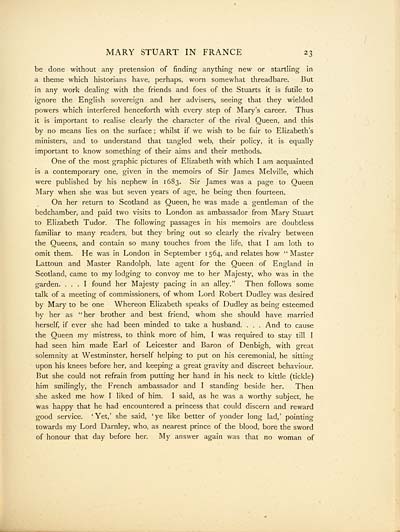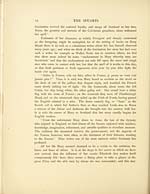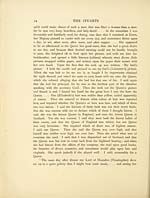Stuarts
(47) Page 23
Download files
Complete book:
Individual page:
Thumbnail gallery: Grid view | List view

MARY STUART IN FRANCE 23
be done without any pretension of finding anything new or startling in
a theme which historians have, perhaps, worn somewhat threadbare. But
in any work dealing with the friends and foes of the Stuarts it is futile to
ignore the English sovereign and her advisers, seeing that they wielded
powers which interfered henceforth with every step of Mary's career. Thus
it is important to realise clearly the character of the rival Queen, and this
by no means lies on the surface ; whilst if we wish to be fair to Elizabeth's
ministers, and to understand that tangled web, their policy, it is equally
important to know something of their aims and their methods.
One of the most graphic pictures of Elizabeth with which I am acquainted
is a contemporary one, given in the memoirs of Sir James Melville, which
were published by his nephew in 1683. Sir James was a page to Queen
Mary when she was but seven years of age, he being then fourteen.
On her return to Scotland as Queen, he was made a gentleman of the
bedchamber, and paid two visits to London as ambassador from Mary Stuart
to Elizabeth Tudor. The following passages in his memoirs are doubtless
familiar to many readers, but they bring out so clearly the rivalry between
the Queens, and contain so many touches from the life, that I am loth to
omit them. He was in London in September 1564, and relates how "Master
Lattoun and Master Randolph, late agent for the Queen of England in
Scotland, came to my lodging to convoy me to her Majesty, who was in the
garden. ... I found her Majesty pacing in an alley." Then follows some
talk of a meeting of commissioners, of whom Lord Robert Dudley was desired
by Mary to be one Whereon Elizabeth speaks of Dudley as being esteemed
by her as "her brother and best friend, whom she should have married
herself, if ever she had been minded to take a husband. . . . And to cause
the Queen my mistress, to think more of him, I was required to stay till I
had seen him made Earl of Leicester and Baron of Denbigh, with great
solemnity at Westminster, herself helping to put on his ceremonial, he sitting
upon his knees before her, and keeping a great gravity and discreet behaviour.
But she could not refrain from putting her hand in his neck to kittle (tickle)
him smilingly, the French ambassador and I standing beside her. Then
she asked me how I liked of him. I said, as he was a worthy subject, he
was happy that he had encountered a princess that could discern and reward
good service. 'Yet,' she said, 'ye like better of yonder long lad,' pointing
towards my Lord Darnley, who, as nearest prince of the blood, bore the sword
of honour that day before her. My answer again was that no woman of
be done without any pretension of finding anything new or startling in
a theme which historians have, perhaps, worn somewhat threadbare. But
in any work dealing with the friends and foes of the Stuarts it is futile to
ignore the English sovereign and her advisers, seeing that they wielded
powers which interfered henceforth with every step of Mary's career. Thus
it is important to realise clearly the character of the rival Queen, and this
by no means lies on the surface ; whilst if we wish to be fair to Elizabeth's
ministers, and to understand that tangled web, their policy, it is equally
important to know something of their aims and their methods.
One of the most graphic pictures of Elizabeth with which I am acquainted
is a contemporary one, given in the memoirs of Sir James Melville, which
were published by his nephew in 1683. Sir James was a page to Queen
Mary when she was but seven years of age, he being then fourteen.
On her return to Scotland as Queen, he was made a gentleman of the
bedchamber, and paid two visits to London as ambassador from Mary Stuart
to Elizabeth Tudor. The following passages in his memoirs are doubtless
familiar to many readers, but they bring out so clearly the rivalry between
the Queens, and contain so many touches from the life, that I am loth to
omit them. He was in London in September 1564, and relates how "Master
Lattoun and Master Randolph, late agent for the Queen of England in
Scotland, came to my lodging to convoy me to her Majesty, who was in the
garden. ... I found her Majesty pacing in an alley." Then follows some
talk of a meeting of commissioners, of whom Lord Robert Dudley was desired
by Mary to be one Whereon Elizabeth speaks of Dudley as being esteemed
by her as "her brother and best friend, whom she should have married
herself, if ever she had been minded to take a husband. . . . And to cause
the Queen my mistress, to think more of him, I was required to stay till I
had seen him made Earl of Leicester and Baron of Denbigh, with great
solemnity at Westminster, herself helping to put on his ceremonial, he sitting
upon his knees before her, and keeping a great gravity and discreet behaviour.
But she could not refrain from putting her hand in his neck to kittle (tickle)
him smilingly, the French ambassador and I standing beside her. Then
she asked me how I liked of him. I said, as he was a worthy subject, he
was happy that he had encountered a princess that could discern and reward
good service. 'Yet,' she said, 'ye like better of yonder long lad,' pointing
towards my Lord Darnley, who, as nearest prince of the blood, bore the sword
of honour that day before her. My answer again was that no woman of
Set display mode to:
![]() Universal Viewer |
Universal Viewer | ![]() Mirador |
Large image | Transcription
Mirador |
Large image | Transcription
Images and transcriptions on this page, including medium image downloads, may be used under the Creative Commons Attribution 4.0 International Licence unless otherwise stated. ![]()
| Histories of Scottish families > Stuarts > (47) Page 23 |
|---|
| Permanent URL | https://digital.nls.uk/95239615 |
|---|
| Description | A selection of almost 400 printed items relating to the history of Scottish families, mostly dating from the 19th and early 20th centuries. Includes memoirs, genealogies and clan histories, with a few produced by emigrant families. The earliest family history goes back to AD 916. |
|---|

